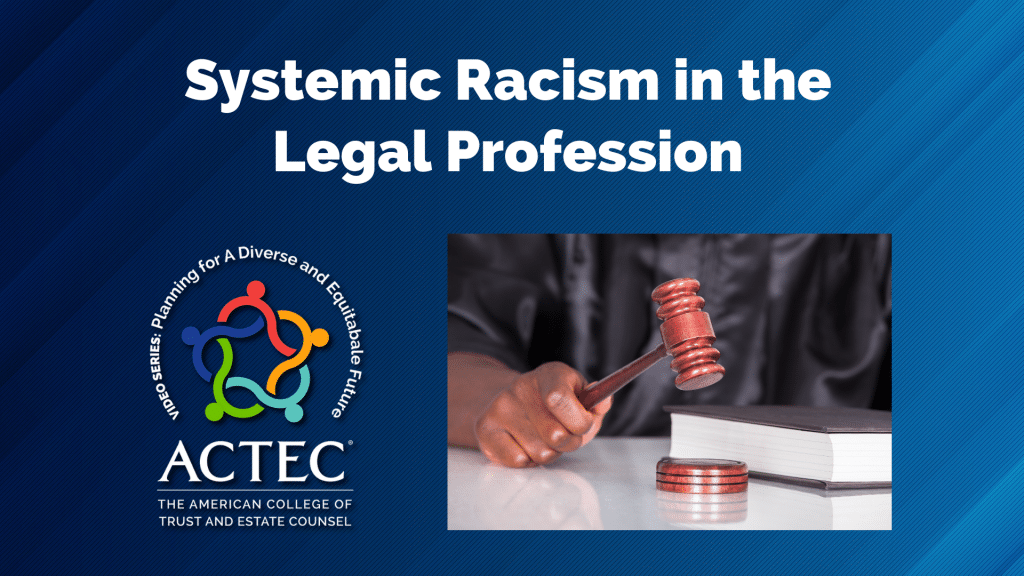ACTEC Releases Video Examining Systemic Racism in the Legal Profession

FOR IMMEDIATE RELEASE
Contact: Pamela Goldsmith, 202.702.2655

Washington, DC – July 12, 2021: The American College of Trust and Estate Counsel (ACTEC) today released its video, Systemic Racism in the Legal Profession, which considers existing biases regarding race and gender and how discrimination can be mitigated to ensure diversity and inclusion in the American legal system. The video is the College’s eighth in its monthly informational series – Planning for a Diverse and Equitable Future, a project of ACTEC’s Diversity, Equity and Inclusivity Committee, funded by The ACTEC Foundation.
Findings in the American Bar Association’s “Profile of the Legal Profession 2020” revealed diversity in the legal profession has remained static. The number of female lawyers in the U.S. increased only 6 percent over the past decade. In 2010, 89 percent of all lawyers were non-Hispanic whites. In 2020, as in 2010, only 5 percent of all lawyers were African American despite comprising 13.4 percent of the U.S. population.
ACTEC Fellow Paula A. Kohut speaks with Judge Ashleigh Parker Dunston, serving the Tenth Judicial District of North Carolina, about her experience with systemic racism as a woman of color in the legal profession. Dunston speaks about what inspired her to write “Justice Isn’t Always Blind,” published in the North Carolina State Bar Journal’s Fall 2020 issue, and other articles addressing topics ranging from sexism to what it’s like to be a minority prosecutor. Recognizing the relevance of current racial dynamics, Dunston began collecting testimonies from African American attorneys across the state of North Carolina to inform her writing.
Based on her unique perspective as a former prosecutor and as an Assistant Attorney General, Dunston offers advice to young diverse lawyers considering the profession and provides recommendations for ensuring a diverse future for the legal system.
“As lawyers, we all have an obligation to make sure every individual that works in our profession and appears in front of us or is a part of the legal system feels seen, feels heard and is not discriminated against,” said Dunston.
For further information about the Diversity, Equity & Inclusivity series, please visit actec.org/diversity.
About The American College of Trust and Estate Counsel (ACTEC): Established in 1949, The American College of Trust and Estate Counsel (ACTEC) is a national, nonprofit association of approximately 2,400 lawyers and law professors from throughout the United States and abroad. ACTEC members (Fellows) are peer-elected on the basis of professional reputation and expertise in the preparation of wills and trusts, estate planning, probate, trust administration and related practice areas. The College’s mission includes the improvement and reform of probate, trust and tax laws and procedures and professional practice standards. ACTEC frequently offers technical comments with regard to legislation and regulations but does not take positions on matters of policy or political objectives.
About The ACTEC Foundation: The ACTEC Foundation is the philanthropic arm of The American College of Trust and Estate Counsel or ACTEC. The Foundation is a nonprofit, 501(c)(3) that offers education to families and professionals and supports students interested in the trust and estate area of the law. Through continued financial support, The ACTEC Foundation offers professional development, scholarships and education for a number of important efforts, including legal education, educational support, public initiatives, legal publications and the student editorial board.
# # #
